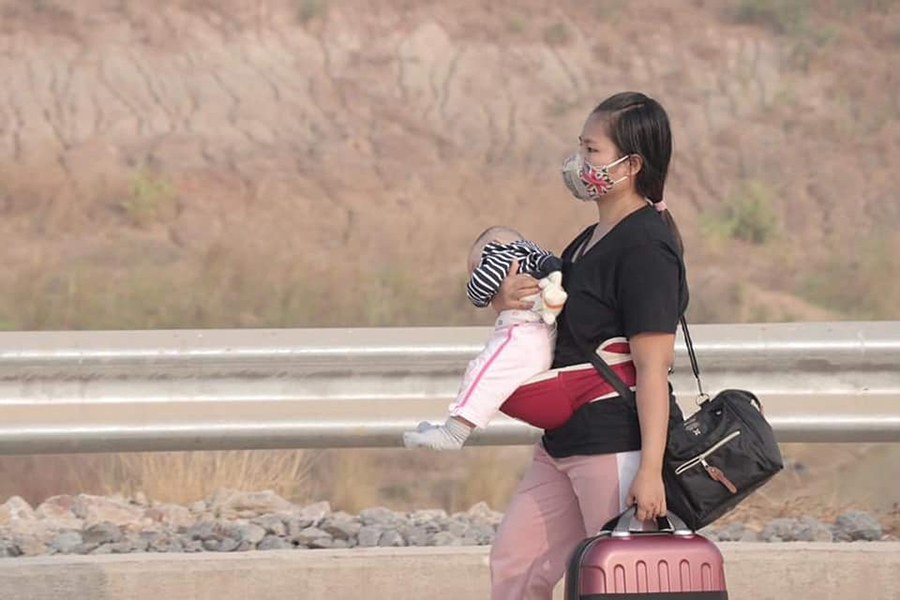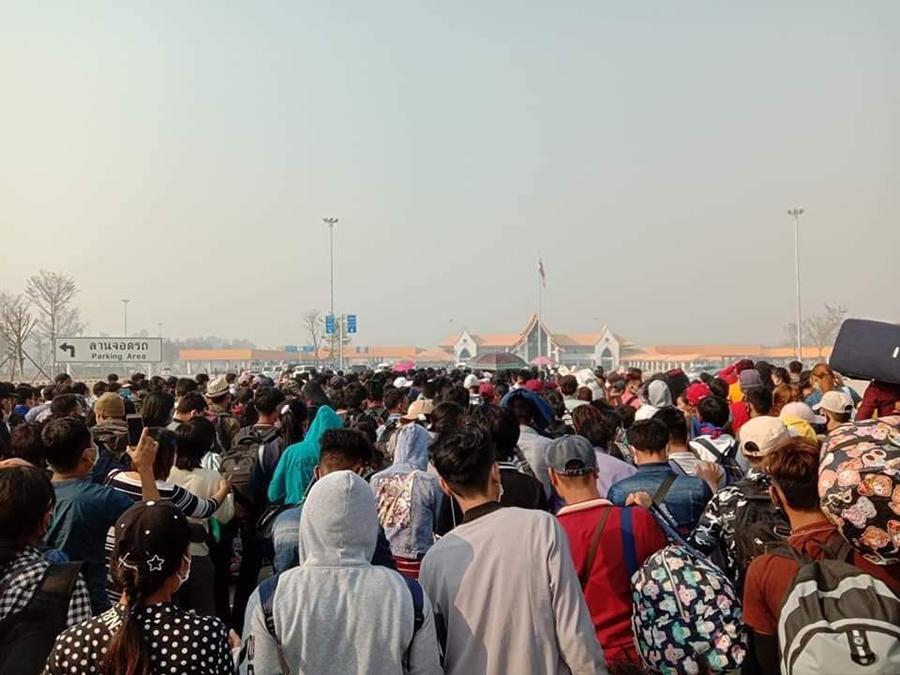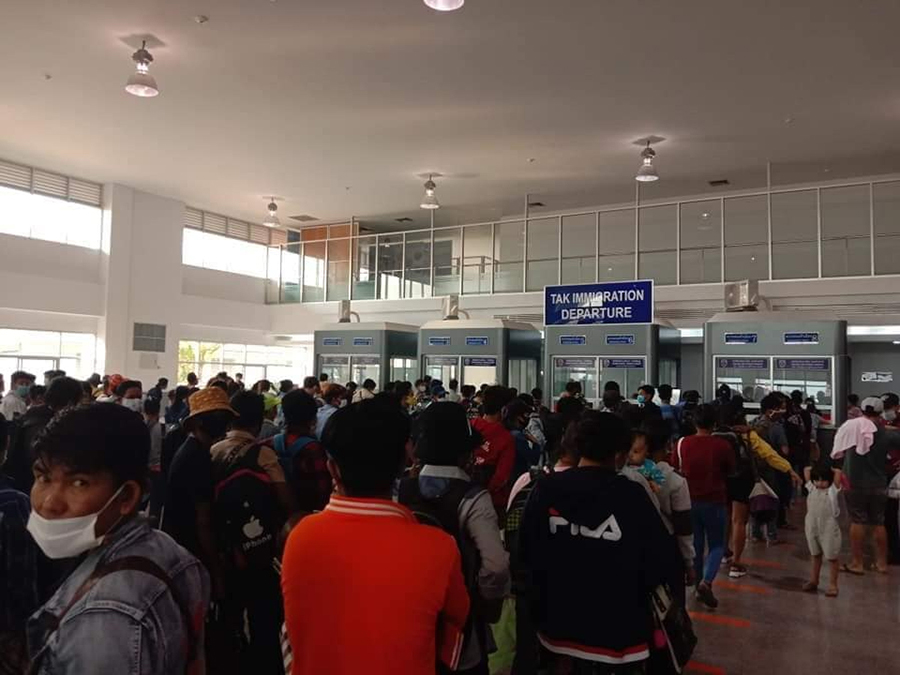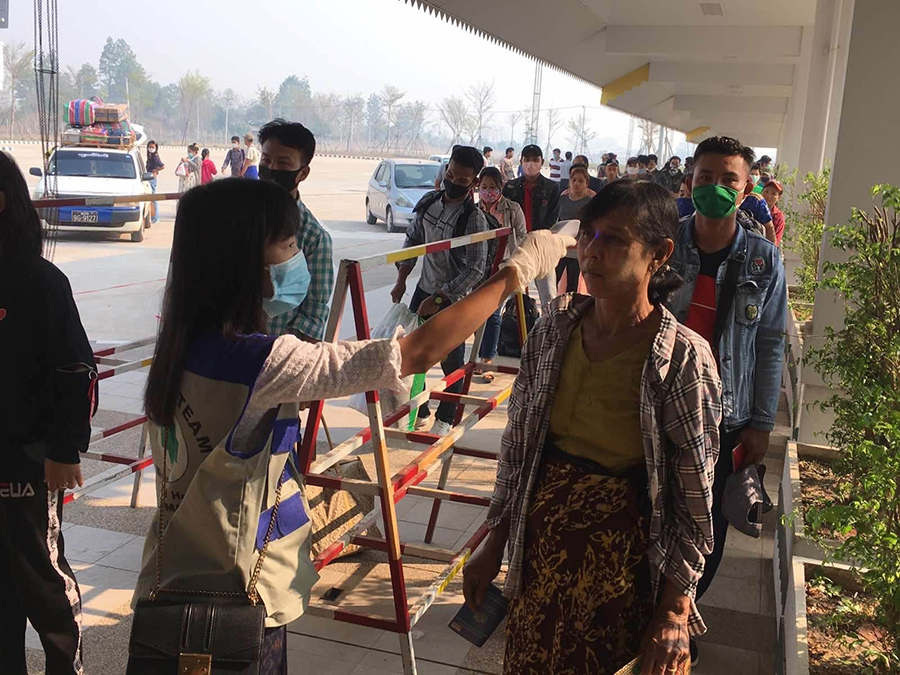Myanmar’s health minister announced on Sunday that any migrant workers returning home from foreign countries must remain under home quarantine for 14 days as “their numbers are too large for quarantine centers to handle.”
The announcement came after at least 10,000 Myanmar workers rushed home over the weekend, shortly before Thailand closed its border checkpoints with Myanmar on Monday due to COVID-19 concerns. Between Saturday and midday on Monday, over 11,000 people crossed into Myanmar at the second Thailand-Myanmar Friendship Bridge in Myawaddy, Karen State.
As of Monday, Thailand has 721 people infected with the coronavirus; one person has died and seven are in critical condition. Bangkok, nearby provinces and Chiang Mai are all in a state of shutdown for two-to-three weeks.
Myanmar still has no confirmed COVID-19 cases, though 206 people suspected of having the disease were under observation as of Sunday evening, according to the Myanmar Ministry of Health and Sports. Test results showed that 187 of these people do not have the coronavirus, while 19 people are still awaiting test results.

On Monday, 1,840 migrant workers had returned to Myanmar across the border with Thailand by midday. About 6,000 people returned on Sunday and 3,400 people returned on Saturday, said U Thant Zin Aung, the state parliamentarian from Myawaddy Township, citing official government figures.
As Myanmar migrant workers have seen their workplaces in Thailand shut down and many more are returning home, Myanmar and Thai authorities kept the Mae Sot-Myawaddy Bridge No. 2 checkpoint open until 6 p.m. on Monday. The Thai government closed all other border checkpoints starting Monday morning. The governor of Thailand’s Tak Province, where Mae Sot is located, closed the Mae Sot-Myawaddy Bridge No. 1 on Saturday.
Starting Monday, Thailand will allow only drivers transporting goods to cross land borders and enter the country.
Mounting fear
Pictures of people waiting to enter Myanmar at the Thai immigration facility in Mae Sot went viral on Facebook over the weekend, prompting fears and questions over the spread of COVID-19.

Officials worked to ensure everyone entering Myanmar at the immigration checkpoint in Myawaddy had to pass a health screening and body temperature check. Officials also asked everyone to stand one meter away from one another. On Monday, the Karen State government also arranged transportation for the migrants back to their hometowns after they passed the necessary health and immigration checks, according to U Tay Zar Aung, the Myawaddy District administrator.
U Thant Zin Aung said that seven buses had left the town for other states and regions on Monday morning. “We have communicated with the respective state and regional governments to follow up with [the migrant workers’] home quarantine process,” he added.
However, questions still remained about the efficacy of home quarantine for the migrants as they may be unable to follow quarantine rules.
Dr. Cynthia Maung, physician and founder of Mae Tao Clinic, told The Irrawaddy that given the number of people at the checkpoint, it would be hard to say whether they are all free of the virus.
“It is important that the migrants returning home understand that it is compulsory to do self-isolation,” said the physician. Dr. Cynthia Maung has been providing healthcare services and health awareness to migrant workers and residents along the Thailand-Myanmar border for more than three decades.
She also pointed out that as the migrant workers are returning from Thailand, which has cases of COVID-19, their home communities must not discriminate against the workers or blame them for possibly carrying the virus into Myanmar.
Dr. Sid Naing, the country director of Marie Stopes International in Yangon, said the Myanmar government’s efforts to alert the migrant returnees about self-quarantine will be somewhat effective, even if it’s flawed.
“As a health professional, the government’s tackling [of COVID-19] may seem slow and weak. However, given the political and socioeconomic circumstances our country is facing, what more could the government do?” he said.
The Myanmar government has already struggled to quarantine hundreds of those entering the country by air.
“Now we have massive waves of people going back to their homes from work in other countries. Human and financial resources and the locations are the biggest challenges,” he explained.

Returning home
Myanmar migrant workers have been returning en masse from Thailand due to both factory and workplace closures as well as challenges around visa and work permit extensions. The annual extension period for migrant workers’ visas is ending in late March.
“My visa is expiring on March 31 and I could not extend it as the cost this year is too high,” said migrant worker Ko Htike, who plans to leave Thailand for his home in a village in Ayeyarwady Region.
He is one of tens of thousands of migrant workers whose work permits and visas will expire at the end of this month. Last year, the visa extension fee was 1,000 baht (US$30.35), Ko Htike said, but this year agents asked for 4,600-5,000 baht to extend a visa.
“We have less overtime work and our earnings are decreasing, so we could not afford it,” he told The Irrawaddy.
In Thailand, if migrant workers change employers, it costs them extra, as they will have to seek a new work permit with new employer in addition to a visa extension. Last year, Ko Htike said it cost some 5,000 baht for processing altogether—including medical insurance, visa fees, new work permit fees and other costs—but this year the agents are asking for 17,000-18,000 baht.
The cost of bus tickets has also increased. Until last Thursday, it cost 500 baht to travel from Nakhon Pathom to Mae Sot, but Ko Htike said that since last Friday, the bus fare has doubled.
According to Ko Htike, many of his friends have returned to Myanmar and some are still planning to return. “We follow the news and many of us are affected economically by the COVID-19 pandemic. We will stay in home quarantine, so we will feel safe both for our family and our community,” he said.
But with the official border checkpoints closed, he said, “We will take a chance and will cross the border by other means.”
He may be lucky, as the Myanmar government so far still allows border crossings by boat across the Moei river at the three unofficial border crossing gates mostly controlled by the Karen Border Guard Force (BGF). The BGF announced last week that they closed nine of the border gates they control.

“Three border crossings are still open and we have prepared the necessary health screenings and checks at these gates,” said U Thant Zin Aung.
While ten of thousands of migrant wokrers are returning, some of them are sticking it out in Thailand and avoiding visits to their homes for the Thingyan holidays, a time when families traditionally gather.
Ma Sandar Win, who is from Tat Kone Village, near Naypyitaw, has been working in Thailand for six months. As she came with a passport with a two-year work permit, known as an MOU passport, she does not need to go back yet.
“I will stay in Thailand and my employer has also urged us not to go out here. We do not go to crowded places and we only commute from home to work and sometimes go to the local bazaar. Our parents are worried for us, but we told them not to worry,” she told The Irrawaddy.
You may also like these stories:
Myanmar’s Military Braced for Coronavirus Outbreak: Spokesman

















